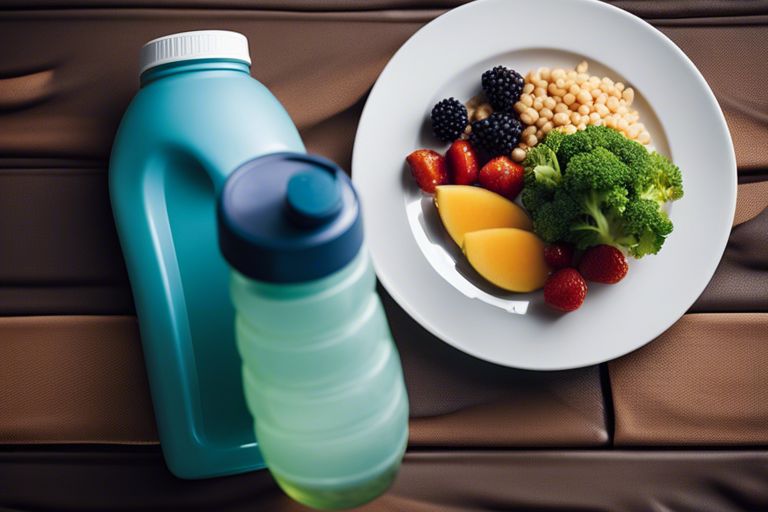Concerning jogging, proper nutrition plays a vital role in ensuring a speedy recovery and optimal performance. While certain foods can aid in post-run recovery, there are specific ones that should be avoided to prevent potential setbacks. In this blog post, we will explore some key elements of nutrition that runners should steer clear of to support their recovery process and enhance their overall fitness journey. By understanding what to avoid, you can better fuel your body for success and achieve your running goals more effectively.
Key Takeaways:
- Hydrate: It is crucial to drink plenty of fluids after jogging to aid in recovery.
- Avoid Sugary Drinks: Steer clear of sugary drinks such as soda, as they can hinder the recovery process.
- Refuel with Protein: Consuming protein-rich foods post-jogging can help repair and build muscles.
- Avoid Processed Foods: Stay away from processed foods high in unhealthy fats and sugars for better recovery.
- Include Nutrient-dense Foods: Opt for nutrient-dense foods like fruits, vegetables, and whole grains to support recovery.
Common Misconceptions About Post-Jogging Nutrition
Myths About Protein Intake
One common misconception about post-jogging nutrition is the belief that consuming large amounts of protein immediately after a run is necessary for muscle recovery. While protein is important for repairing and building muscle tissue, excessive consumption can actually lead to digestive issues and hinder the body’s ability to absorb important nutrients. It is more effective to spread out your protein intake throughout the day rather than loading up on it all at once.
The Overestimation of Caloric Needs
Another prevalent misconception is the tendency to overestimate the number of calories burned during a jogging session, leading to overcompensation in post-workout meals. It is important to remember that the number of calories burned varies based on factors such as intensity, duration, and individual metabolic rate. Consuming excessive calories post-jogging can hinder weight loss goals and even lead to weight gain over time. It is advisable to focus on nutrient-dense foods rather than simply increasing caloric intake.
Foods and Beverages to Avoid for Optimal Recovery
Processed Sugars and Unhealthy Carbs
Avoiding processed sugars and unhealthy carbs is crucial for optimal recovery after jogging. Foods high in added sugars and refined carbohydrates can lead to inflammation and a spike in blood sugar levels, hindering the body’s recovery process. Opt for whole, unprocessed foods like fruits, vegetables, and whole grains to provide sustained energy and necessary nutrients for recovery.
Alcohol and Caffeinated Drinks
When focusing on recovery post-jogging, it is best to avoid alcohol and caffeinated drinks. Both alcohol and excessive caffeine consumption can dehydrate the body, disrupt sleep patterns, and hinder the body’s ability to repair and recover effectively. Instead, opt for hydrating beverages like water, herbal teas, or natural fruit juices to support recovery.
Alcohol and caffeinated drinks can be tempting choices, but they can have negative effects on your body’s recovery process. Alcohol can interfere with muscle repair and glycogen replenishment, while caffeine in excess can lead to increased heart rate, dehydration, and disturbed sleep. To promote optimal recovery, it’s advisable to limit or avoid these substances altogether.
High-Fat Foods and Heavy Meals
Avoiding high-fat foods and heavy meals post-jogging is necessary for efficient recovery. Consuming greasy, high-fat meals can slow down digestion and leave you feeling sluggish, making it harder for your body to recover and repair. Instead, focus on light, nutrient-dense meals that provide the necessary energy without weighing you down.
High-fat foods and heavy meals can be difficult for the body to process, especially after a workout. These types of foods can lead to discomfort, bloating, and reduced nutrient absorption, delaying the recovery process. Opting for lighter, balanced meals rich in lean protein, complex carbohydrates, and necessary vitamins and minerals can help promote faster and more effective recovery.
The Timing of Meals and Snacks Post-Jogging
The Anabolic Window: Fact or Fiction?
There has been much debate surrounding the concept of an “anabolic window” post-exercise, suggesting that there is a specific period after a workout where nutrient consumption is crucial for maximising muscle growth and recovery. While early studies supported the idea of a narrow window, more recent research indicates that the overall nutrient intake throughout the day is more important than immediate post-workout timing. Therefore, focusing on a well-balanced diet consistently rather than stressing about consuming protein within a specific timeframe is key for optimal recovery.
Scheduling Meals for Muscle Recovery
Regarding scheduling meals for muscle recovery post-jogging, it’s necessary to prioritise a combination of protein and carbohydrates to replenish glycogen stores and support muscle repair. Aim to consume a meal or snack within an hour of your workout, focusing on quality sources of protein like chicken, fish, tofu, or pulses, along with whole grains or fruits for a balanced nutrient intake.
It is important to note that individual nutritional needs may vary based on factors such as workout intensity, duration, and personal goals. Consulting with a nutritionist or dietitian can help tailor a post-jogging meal plan that meets your specific recovery needs.
Nutritional Alternatives for Enhanced Recovery
Anti-inflammatory Foods
With respect to enhancing post-exercise recovery, incorporating anti-inflammatory foods into your diet can be highly beneficial. Foods such as berries, fatty fish, green leafy vegetables, and nuts can help reduce inflammation in the body, allowing for quicker recovery and reduced muscle soreness. Including these foods in your post-exercise meals or snacks can aid in speeding up the recovery process and getting you back on track with your fitness goals.
Rehydration Essentials: What to Drink
Proper rehydration is crucial for recovery after a strenuous workout. While water is necessary, incorporating electrolyte-rich drinks such as coconut water or sports drinks can help replenish the minerals lost through sweat and aid in faster recovery. Avoid sugary drinks and excessive caffeine, as they can dehydrate the body and hinder the rehydration process. Aim to consume fluids before, during, and after your workout to optimise recovery and performance.
Jogging and Nutrition – What to Avoid for Recovery
When considering jogging and nutrition, there are certain foods and habits to avoid for a better recovery process. High-fat foods can slow down digestion and may leave you feeling sluggish during runs. Sugary snacks may give you a quick energy boost, but can lead to a crash later on. It’s best to steer clear of alcohol, as it can dehydrate the body and hinder muscle recovery. Caffeine should also be consumed in moderation as it can increase heart rate and lead to dehydration. To optimise your jogging performance and recovery, focus on consuming a balanced diet rich in lean proteins, complex carbohydrates, and plenty of fresh fruits and vegetables.
FAQ
Q: Why is nutrition important for jogging recovery?
A: Nutrition plays a crucial role in jogging recovery as it helps replenish energy stores, repair muscle damage, and reduce inflammation.
Q: What foods should be avoided for recovery after a jogging session?
A: Avoid foods high in processed sugars and fats as they can slow down the recovery process and increase inflammation in the body.
Q: Is it advisable to consume alcohol after a jogging workout?
A: It is best to avoid alcohol after a jogging session as it can dehydrate the body, hinder muscle recovery, and reduce the benefits of the workout.
Q: How important is hydration for post-jogging recovery?
A: Hydration is crucial for post-jogging recovery as it helps replace fluid loss, aids in nutrient transport to muscles, and supports overall recovery process.
Q: Should I avoid skipping meals after a jogging workout?
A: It is not advisable to skip meals after a jogging workout as your body needs fuel to recover and repair. Make sure to have a balanced meal with carbohydrates, proteins, and healthy fats.






